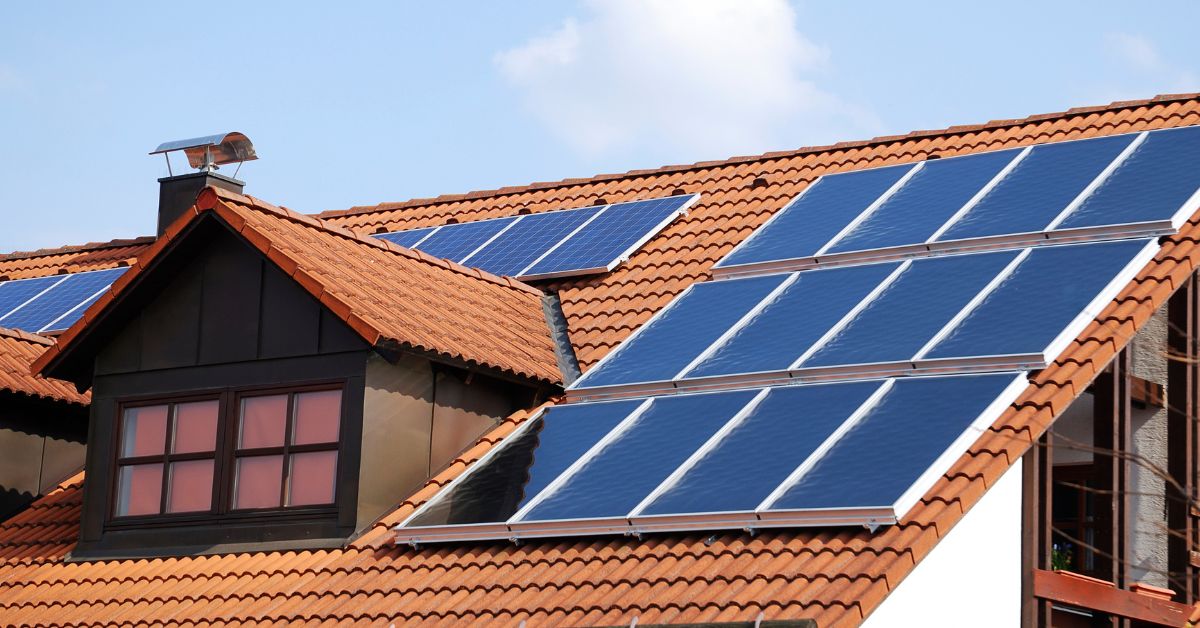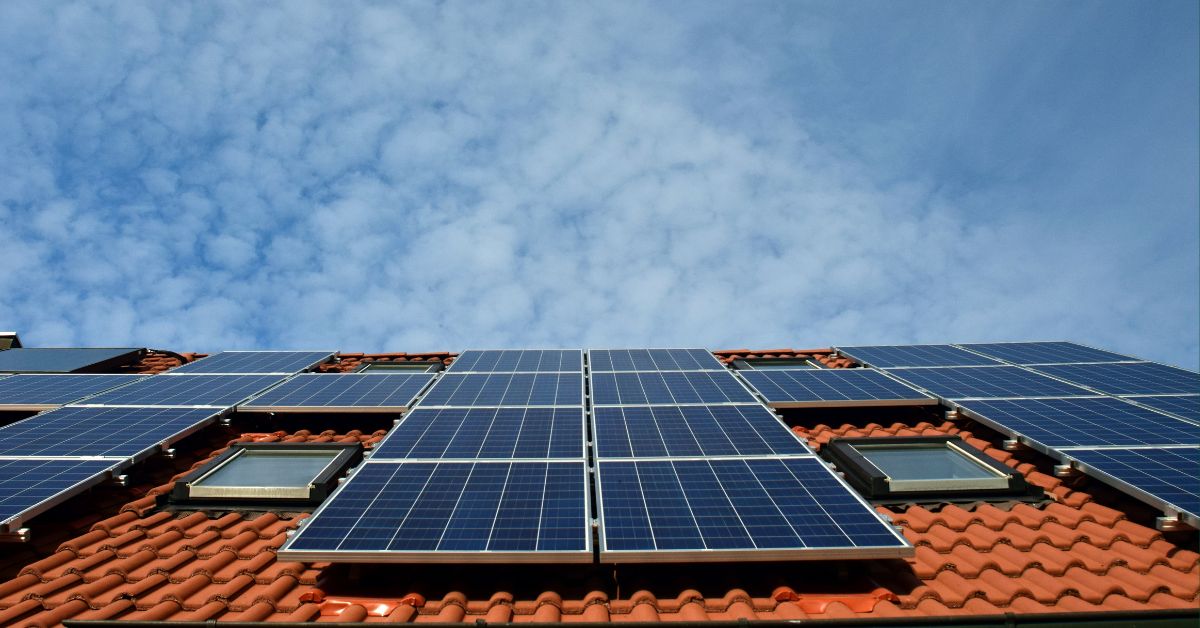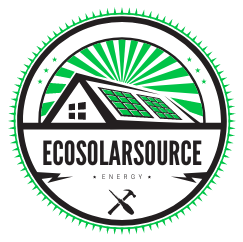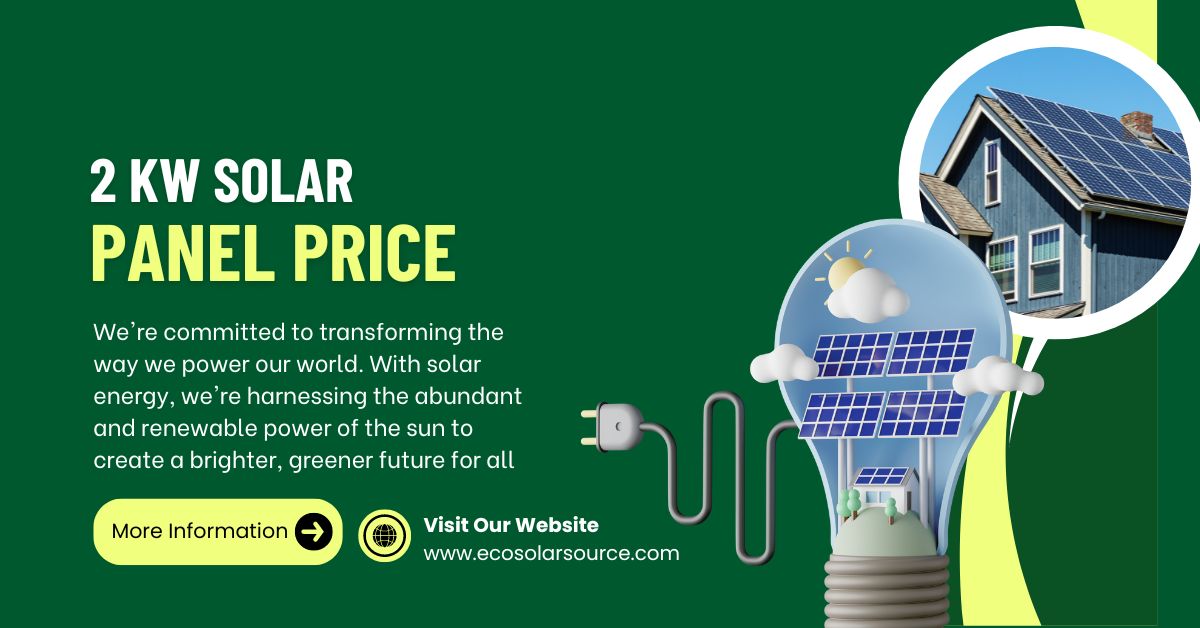2 kW Solar Panel Price
Know the details about 2 kW Solar Panel Price, A 2 kW solar panel system is efficient and cost-effective for powering small to medium-sized homes or businesses. Such a system typically ranges from $1,800 to $3,000, depending on the brand, quality of components, and installation costs.
This system generates approximately 8-10 kWh of electricity daily, reducing energy bills while promoting sustainability. The price includes the panels, inverter, mounting hardware, and basic installation. With government incentives and tax rebates, the upfront cost can be reduced further, making solar energy a more accessible option for eco-conscious consumers seeking long-term savings.
Table of Contents
2 kW Solar Panel Price: A Comprehensive Guide to Costs, Installation, and Savings
Solar energy has emerged as a reliable and eco-friendly alternative to traditional power sources, enabling households and businesses to save on electricity bills while contributing to a greener planet. A 2 kW solar panel system is often considered an ideal size for small homes or those looking to offset a portion of their electricity usage. In this guide, we will cover everything you need to know about the price of a 2 kW solar panel system, including its components, installation costs, savings potential, and how to maximize your investment.
What Is a 2 kW Solar Panel System?
A 2 kW solar panel system refers to a solar array capable of generating 2 kilowatts (kW) of power under ideal sunlight conditions. This system typically consists of solar panels, inverters, mounting hardware, and wiring. A 2 kW system is ideal for smaller households or families with moderate energy consumption. It allows homeowners to reduce their electricity bills by supplementing their grid usage with solar energy.

How Much Energy Does a 2 kW Solar System Generate?
The amount of electricity generated by a 2 kW solar panel system depends on several factors, including the amount of sunlight in your location, the orientation of the panels, and local weather conditions. On average, a 2 kW system generates between 8 to 10 kWh (kilowatt-hours) of electricity per day.
This amount of electricity is sufficient to power small appliances, lights, and some home electronics. Over a year, a 2 kW system can generate approximately 3,000 to 4,000 kWh of energy, depending on where you live.
Components of a 2 kW Solar System
A 2 kW solar system is composed of several key components:
- Solar Panels: Photovoltaic (PV) panels that capture sunlight and convert it into electricity. A 2 kW system will typically include around 6 to 8 solar panels, each with a capacity of 250 to 350 watts.
- Inverter: This device converts the direct current (DC) generated by the solar panels into alternating current (AC), which is usable by your home appliances.
- Mounting System: This includes the racking and hardware required to secure the solar panels to your roof or another mounting surface. A well-designed mounting system ensures that the panels are at the optimal angle for maximum sunlight exposure.
- Wiring and Connectors: These components safely transmit electricity from the solar panels to the inverter and into your home’s electrical system.
- Monitoring System (Optional): Some systems come with monitoring tools that allow you to track energy production and usage in real time via a smartphone or computer.
Factors Affecting 2 kW Solar Panel Price
Several factors contribute to the price of a 2 kW solar panel system:
- Panel Quality: High-efficiency solar panels tend to cost more, but they produce more electricity per square meter. Lower-cost panels may be less efficient, requiring more space to generate the same amount of power.
- Inverter Type: There are several types of inverters, including string inverters, microinverters, and power optimizers. Microinverters tend to be more expensive but offer better efficiency, especially for systems with shading issues.
- Installation Complexity: The design of your roof, the height of your home, and other structural factors can impact installation costs. If your roof is steep or requires special equipment, labor costs may increase.
- Location: Prices can vary by region due to differences in labor costs, permitting fees, and local taxes.
- Government Incentives: The availability of tax credits, rebates, and other incentives can significantly reduce the overall cost of your solar system.
Breakdown of the 2 kW Solar Panel Price
The price of a 2 kW solar panel system can vary widely based on the factors mentioned above. On average, the total cost for a 2 kW system ranges between $3,000 and $6,000 before incentives. Here is a rough breakdown of the cost components:

- Solar Panels: $1,500 to $2,500
- Inverter: $500 to $1,000
- Mounting System: $300 to $600
- Installation (Labor): $1,000 to $2,000
- Permitting and Inspection Fees: $100 to $500
- Monitoring System (Optional): $200 to $500
These figures are general estimates, and the final price will depend on your location, installer, and system design.
Installation Costs
The cost of installation is a significant factor in the overall price of a 2 kW solar system. Professional installation typically accounts for 20% to 40% of the total system cost. The complexity of the installation plays a big role in the price. For example, a simple installation on a flat, unobstructed roof may be relatively inexpensive, while a more complicated installation on a sloped or shaded roof could drive costs higher.
Savings with a 2 kW Solar System
A 2 kW solar panel system can offer substantial savings on electricity bills, especially in areas with high energy costs. The amount of money you save depends on your energy consumption, local electricity rates, and how much sunlight your system receives.
Here’s how to estimate your savings:
- If a 2 kW system generates around 3,000 to 4,000 kWh per year, and your local electricity rate is $0.15 per kWh, you could save between $450 and $600 annually on your electricity bills.
- Over 20 years, assuming electricity rates increase, these savings could total between $9,000 and $12,000.
Keep in mind that these are rough estimates, and actual savings will vary based on your energy usage, location, and solar system performance.
Government Incentives and Subsidies
Many governments offer financial incentives to the encourage the adoption of solar energy. In the United States, for a example, there is a federal Investment Tax Credit (ITC) that allows the homeowners to deduct a percentage of their solar system of costs from their federal taxes. As of 2023, this credit stands at 30% of the total system cost.
In addition to federal incentives, many states, municipalities, and utility companies offer rebates, grants, or performance-based incentives that can further reduce the cost of your solar system. It’s essential to research the incentives of available in your area to maximize your savings.
Return on Investment (ROI)
The return on investment (ROI) for a 2 kW solar system depends on several factors, including the cost of the system, your electricity savings, and any available incentives. On average, homeowners can expect to see a return on their investment within 6 to 10 years.
After the system has paid for itself, the electricity it generates is essentially free, providing ongoing savings for the lifespan of the system, which can be 25 years or more. The ROI is particularly favorable in areas with high electricity costs or generous solar incentives.
Maintenance and Upkeep
Solar panel systems require very little maintenance once installed. However, to ensure optimal performance, periodic cleaning and inspections are recommended. Dust, dirt, and debris can be a accumulate on the panels, reducing their efficiency. Most solar providers recommend cleaning your panels once or twice a year, depending on your local environment.
Inverters may need to be replaced after 10 to 15 years, but most come with warranties that cover this cost. Regular monitoring of your system’s performance can also help you catch any issues early.
How to Choose the Right Solar Installer
Choosing the right installer is critical to ensuring your system is installed correctly and performs as expected. Here are a few tips for selecting a solar installer:

- Check Credentials: Make sure the installer is licensed and certified, preferably by a recognized organization like the North American Board of Certified Energy Practitioners (NABCEP).
- Ask for References: A reputable installer should be able to provide references from previous clients.
- Compare Quotes: Get quotes from several installers to ensure you’re getting a competitive price. Be wary of any quote that seems significantly lower than others.
- Check Warranties: Ensure the installer offers a solid warranty on both the equipment and the installation work.
- Read Reviews: Look for customer reviews on websites like Google, Yelp, or the Better Business Bureau to get an idea of the company’s reputation.
FAQs About 2 kW Solar Panel Price
Q1. What is the average price of a 2 kW solar panel system?
The average price of a 2 kW solar panel system varies based on location, installation fees, and panel quality, but typically ranges between $3,500 and $6,000 before incentives or rebates.
Q2. How does location affect the cost of a 2 kW solar panel system?
Location impacts the cost due to factors like local installation labor rates, available sunlight, and government incentives, which can reduce overall costs significantly in some regions.
Q3. Are there any government incentives that can lower the price of a 2 kW solar system?
Yes, many countries and regions offer incentives, rebates, or tax credits. In the U.S., for example, the federal solar tax credit (ITC) can reduce the system’s cost by 30%.
Q4. How much can I save on energy bills with a 2 kW solar panel system?
A 2 kW system can generate approximately 8-10 kWh per day, which can significantly reduce your electricity bill depending on your usage and local energy rates, potentially saving $200-$500 annually.
Q5. Is a 2 kW solar panel system enough to power a typical household?
A 2 kW system can meet the needs of small households with low energy consumption but may not be sufficient for larger homes or those with high electricity demands.
Q6. What are factors influence the cost of a 2 kW solar panel system?
Key factors include panel type (monocrystalline, polycrystalline, thin-film), installation costs, inverter type, mounting structure, and whether additional equipment like batteries is included.
Q7. Are installation costs included in the price of a 2 kW solar panel system?
Installation costs are typically additional and can range from 10-25% of the total system price. Some companies offer packages that include installation fees.
Q8. How long does it take for a 2 kW solar panel system to pay for itself?
The payback period varies, but typically ranges between 5 to 10 years, depending on energy savings, local incentives, and electricity prices.
Q9. Can I finance a 2 kW solar panel system?
Yes, many companies offer financing options such as solar loans, leases, or power purchase agreements (PPAs), which can reduce upfront costs and spread payments over time.
Q10. Do solar panel warranties affect the price of a 2 kW system?
Yes, systems with longer warranties (typically 20-25 years) may cost more initially, but they offer added value by providing long-term protection and reliability.
Conclusion: Is a 2 kW Solar System Worth It?
A 2 kW solar panel system can be an excellent investment for homeowners with moderate electricity needs. It offers a way to reduce electricity bills, decrease your carbon footprint, and potentially increase your home’s value. While the upfront cost of a solar system may seem significant, government incentives, energy savings, and the long-term return on investment make it a financially sound decision for many households.
By carefully considering factors like the system cost, available incentives, and your home’s energy consumption, you can make an informed decision on whether a 2 kW solar system is right for you.
Click here to learn more about the 2 kW Solar Panel Price
Click here to learn more about Construction and Working of Solar Cells

